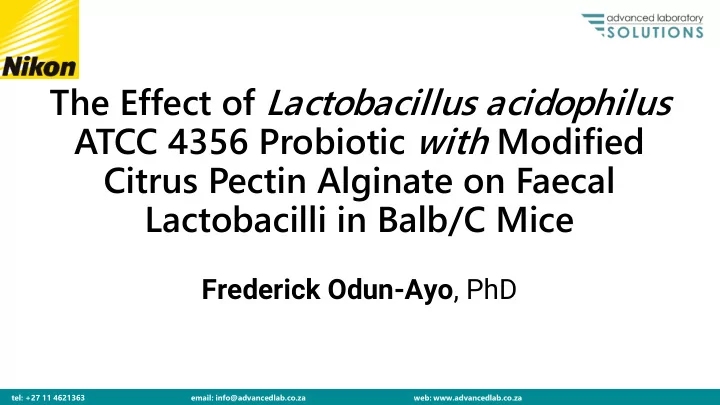

The Effect of Lactobacillus acidophilus ATCC 4356 Probiotic with Modified Citrus Pectin Alginate on Faecal Lactobacilli in Balb/C Mice Frederick Odun-Ayo , PhD tel: +27 11 4621363 email: info@advancedlab.co.za web: www.advancedlab.co.za
Introduction • Probiotics have been defined as live microorganisms that, when administered in adequate amounts, confer a health benefit on the host. • Live microbial feed and food supplement that beneficially affect the host’s intestinal tract. • Modified citrus pectin (MCP) is a natural polysaccharide used as supplements for cell proliferation. • Intestinal bacteria utilize the constituent of ingested food for their metabolic activities making the gut microbiota a target in the modification of functional supplement foods. tel: +27 11 4621363 email: info@advancedlab.co.za web: www.advancedlab.co.za
AIM • To examine the effect of microencapsulated probiotic Lactobacillus acidophilus ATCC 4356 with/without MCP and alginate calcium (AC) on the faecal lactobacilli microbiota population in healthy Balb/c mice. tel: +27 11 4621363 email: info@advancedlab.co.za web: www.advancedlab.co.za
Step 1: Step 2: Step 3: Dispersion of the droplets Hardening by Coating by addition of by emulsi fi cation addition of CaCl 2 Chitosan Canola oil-Lecithin (organic phase) Microencapsulated probiotic beads Matrix polymers (MCP and alginate) + probiotic cells ( L. acidophilus ATCC 4356 ) Fig 1. Schematic diagram of the emulsification polymerization procedure tel: +27 11 4621363 email: info@advancedlab.co.za web: www.advancedlab.co.za
Fig 2. The morphology of (A) modified citrus pectin alginate (MCPA) and (B) alginate calcium (AC) probiotic microbead particles produced by emulsification with arrows indicating the chitosan coating. tel: +27 11 4621363 email: info@advancedlab.co.za web: www.advancedlab.co.za
7 weeks old Balb/c mice weighing 20 – 25 g were bred Oral administration of mice once a day for 28 days with 0.2 ml of : Modified citrus pectin alginate Alginate calcium (AP) Modified citrus pectin Water (control) (MCPA) probiotic microbeads probiotic microbeads (MCP) n= 10 mice n= 10 mice n= 10 mice n= 10 mice Examination of faecal matter for bacterial cocktail Fig 3: Schematic flow of oral administration of microencapsulated probiotic uptake in Balb/c mice model tel: +27 11 4621363 email: info@advancedlab.co.za web: www.advancedlab.co.za
Fig 4. Average faecal lactobacilli count (log10cfu/g) in mice administered with modified citrus pectin alginate (MCPA), alginate calcium (AC) probiotics, modified citrus pectin solution (MCP) and water (control) for 28 days. tel: +27 11 4621363 email: info@advancedlab.co.za web: www.advancedlab.co.za
Limitation • In vivo sampling of the colon tissue as some lactobacilli may colonized discrete areas in the mouse intestinal tract or remain adherent to the mucosal surfaces and therefore remain non- detectable from the faeces using microbiological agar. tel: +27 11 4621363 email: info@advancedlab.co.za web: www.advancedlab.co.za
Conclusion • Modified citrus pectin alginate probiotic microbead presents to be a novel and effective oral delivery of bacterial cells and also an adjunct (combined with health beneficial bacteria) to supplementary dietary. • The addition of L. acidophilus ATCC 4356 with MCP and alginate increases the number of feacal lactobacilli in the mice. • Therefore, the co-administration of live probiotic, L. acidophilus ATCC 4356 with MCP supplement helps to maintain and/or improve the integrity and population of the intestinal microbiota. tel: +27 11 4621363 email: info@advancedlab.co.za web: www.advancedlab.co.za
Recommend
More recommend